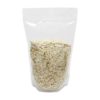Blog
Exciting New Composted Fertilizer from Tea Waste Initiative
For some time, environmentalists have been begging the world’s population to reduce the amount of waste that we produce. In many countries, their appeals have borne fruit, and things that were previously thrown into landfills are now recycled with considerable benefits to the economy and the environment.
At the same time companies were asked to look at their manufacturing processes and give up the old-fashioned and environmentally unaware “take, make and dispose” manufacturing processes. They were asked instead to consider redesigning their manufacturing process so that they refurbished, reused, repaired and integrated their usage loops for materials and energy. Companies took up the fight, and some fantastic initiatives were implemented that resulted in vital savings of water, energy and other recoverable materials.
Zero-Waste from Nestle
The latest company to join the ranks of these environmental saviors is Nestlé. They have created a zero-waste fertilizer initiative at their tea processing plant in Pakistan. Tea generates a considerable amount of waste during its life cycle from the farm, through manufacturing to the disposal of a used tea bag.
Research has shown that in India alone, for the almost 860,000 metric tonnes of production, over 190,000 tons of waste leaves and other fragments are not packed into their saleable products.
Nestlé’s plan is not to just discard the waste from their tea manufacturing processes but to take it and turn it into an environmental and economic asset. The herbaceous waste material is packed full of nitrogen, phosphorus and potassium, all elements that can be quickly returned to the soil. Nestlé wants to take all this waste leaf and compost it to produce a fertilizer that can be sold back to farmers to apply as compost to their fields.
As Pakistan produces around 200,000 metric tons of tea waste each year, this amounts to a substantial potential yield of compost. The only snag is to find partners that can take the amount of waste produced by Nestlé, in many locations across the country.
How it will work
Nestlé already has an enviable record globally for the reduction of waste, and one in five of its food factories produces zero waste. Nestlé’s use of circular economics has already resulted in a decrease of 75 percent of waste in other countries.
Nestlé’s innovation platform, HENRi drives the current initiatives around tea production. The first phase of this initiative is based in Pakistan, and once the teething troubles have been resolved, it will be rolled out to China, and India and then onto all other tea producing countries.
This initiative will focus on the collection of all tea waste by collaborating with start-up companies, waste management companies and any innovators that can contribute to the success of the project.
The next phase will involve converting the tea waste into fertilizer by composting. Phase III will include selling the composted fertilizer to farmers to enrich the soil so that crop yields are improved.
More Original Initiatives
Composting is not the only way tea waste can be turned into an asset. While the creation of fertilizer is a fantastic opportunity, there are other opportunities for the use of tea waste. These include;
Bio-fuels
The manufacture of biomass fuel, bio-oil, and bio-char as waste is composted using a fluidized bed pyrolysis methodology. This process involves thermal decomposition with no oxygen.
Building Materials
Tea waste contains a high percentage of pectin, cellulose, sugar, and starch which can be transformed into bricks by adding it to clay.
Soil Recovery
Tea waste has the potential to absorb heavy chemicals such as chromium and zinc, making it a perfect product to restore contaminated soils.
Secondary Markets
Tea has long been acknowledged to be high in antioxidants, and Iranian scientists have successfully extracted these antioxidants from tea waste. These antioxidants can be sold on to other markets.
Farmers in West Bengal have already made inroads to selling their waste into the domestic and international caffeine markets. These products are used in the pharmaceutical industry.
Caffeinated waste is also a favored animal feed for poultry and pigs.
Important to Note
Several important points arise out of Nestlé’s announcement.
Firstly, the concept of zero waste is not a pipedream; it is an eminently achievable objective.
Secondly, the concept of zero waste must be incorporated into the entire supply change management and must be seen a part of the everyday business of the firm; it is not a glorified add-on.
Lastly, the achievement of a zero-waste target cannot be achieved by one organization. Practical solutions to this problem can only be found by many working together with the clear understanding that we are all in this together.
If we are all to fight the scourges of our modern world, we must use all the tools available to us and recognize that alliances that are socially driven such as Fair Trade are increasingly becoming important along with climate change and addressing social inequalities. If we do not find a way of standing together the circular economy that we need to address these issues will not gain favor over the current linear economy. All the nations of the world must ensure that everyone is included and not only the select few.





